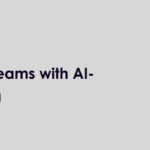Unlocking Transparency: GenAI’s Potential in Public Sector Innovation

What is an EHCP?
An Educational Health and Care Plan (EHCP) is a crucial document for children and young people with special educational needs and disabilities (SEND). However, creating and managing EHCPs can be complex, time-consuming, and demanding for local authorities.
The EHCP Process
The EHCP process typically involves the following stages:
- Request for Assessment: Parents, carers, or professionals can request an EHCP assessment if they believe a child or young person has SEND that requires additional support.
- Assessment: The local authority must decide within six weeks whether to carry out an assessment. If they agree, they have 20 weeks to complete the assessment and decide if an EHCP is needed.
- Draft EHCP: If an EHCP is required, the local authority creates a draft plan and shares it with parents/carers for their input.
- Final EHCP: After considering feedback, the local authority issues the final EHCP, outlining the child’s needs and the support to be provided.
- Review: EHCPs are typically reviewed annually, or more frequently if needed, to assess progress and update the plan accordingly.
The Promise of AI-Powered Solutions
“Using AI in the EHCP process is an exciting development. By analysing large datasets, we can gain valuable insights into the needs of children and young people, leading to more effective support plans.” – Professor Jane Allen, University of Manchester
Imagine a world where EHCP plans are created faster, with more accuracy, and with less administrative hassle. This is what AI-powered solutions can offer. By harnessing the power of artificial intelligence, local authorities can streamline the EHCP process, freeing up time and resources to focus on providing the best possible support to children and young people with SEND.
The Challenges of the EHCP Process
Creating an EHCP is a complex task that involves multiple agencies, professionals, and parents. It requires gathering and analysing a lot of information. The process often faces these issues:
- Time-consuming: It takes a significant amount of time to create an EHCP, which diverts resources away from directly supporting children and young people.
- Complex: The process involves many steps and stakeholders, making it difficult to manage and coordinate.
- Inconsistent: The quality and completeness of EHCPs can vary due to differences in knowledge and expertise among professionals.
- Data-intensive: Collecting and managing data for EHCPs is a major administrative burden.
The Power of AI
AI has the potential to transform the EHCP process by automating many time-consuming and repetitive tasks. With advanced algorithms and machine learning, AI can:
- Speed up the process: AI can quickly analyse and process large volumes of data, reducing the time it takes to create an EHCP.
- Improve accuracy: AI can identify patterns and inconsistencies in data, ensuring EHCPs are accurate and complete.
- Enhance decision-making: AI can provide insights and recommendations based on data analysis, helping professionals make informed decisions.
- Streamline workflows: AI can automate routine tasks, allowing staff to focus on higher-value activities.
Specific AI Applications for EHCPs
- Data collection and management: AI can automate the collection and organisation of information from various sources, such as assessments, reports, and parent views.
- Needs assessment: AI can analyse data to identify patterns and trends in children’s needs, helping to develop targeted support plans.
- Plan generation: AI can generate initial drafts of EHCPs based on standardised templates and data, reducing the time spent on document creation.
- Outcome measurement: AI can track and analyse outcomes to measure the effectiveness of EHCPs and identify areas for improvement.
The Benefits of AI-Powered EHCPs
Implementing AI solutions can bring several benefits to local authorities, including:
Increased satisfaction
- Faster turnaround times: Reduced processing times for EHCPs can lead to increased satisfaction among parents and carers.
- Improved outcomes: By providing more accurate and personalised support, AI can contribute to better outcomes for children and young people with SEND.
Improved efficiency
- Faster EHCP creation: AI can automate the process of gathering information from various sources (medical reports, educational assessments, parent input), reducing the time spent on data collection and organisation.
- Reduced paperwork: By digitising the EHCP process, AI can minimise the need for physical paperwork, streamlining workflows and saving time for staff.
Enhanced accuracy
- Fewer errors in data entry: AI can detect inconsistencies and errors in data, preventing mistakes from being carried forward in the EHCP.
- Consistent application of guidelines: AI can ensure that EHCPs adhere to specific guidelines and regulations, minimising variations in quality.
Better decision-making
- Data-driven insights: AI can analyse large datasets to identify trends and patterns in children’s needs, informing evidence-based decision-making.
- Personalised support plans: By understanding individual needs more deeply, AI can help create tailored EHCPs that address specific challenges.
Cost savings
- Reduced administrative burden: Automation of tasks can free up staff time, allowing them to focus on direct support for children and young people.
- Optimised resource allocation: AI can help identify areas where resources can be used more effectively, leading to cost savings.
Overcoming Challenges and Setting up Timelines
“AI has the potential to transform the way we support children and young people with SEND. By automating routine tasks, we can free up staff to focus on building relationships and providing personalised support.” – Dr. Claire Darwin, Suffolk County Council
Implementing AI solutions needs extensive planning and consideration. Key challenges include:
- Data quality: To be effective, AI must ensure that its data is accurate and complete.
- Staff training: In order to comprehend and efficiently use AI tools, employees will require training.
- Ethical considerations: AI systems must be designed and used in an ethical and responsible manner.
To address these issues, local authorities should invest in data quality.
- Use solid data management methods to ensure accuracy and consistency.
- Provide extensive training. Provide training to employees on AI tools and their benefits.
- Develop clear ethical guidelines: Create rules for the ethical application of AI in the EHCP process.
By addressing these challenges and establishing clear deadlines, local authorities may successfully rely on artificial intelligence (AI) solutions and enjoy the benefits.
EHCP Plus: A Powerful AI Tool
EHCP Plus is an innovative platform gives back time that can be spent on things that truly matter, improving the lives of children and young people. It significantly reduces the administrative burden associated with EHCP creation by using generative AI to produce a first draft EHCP for the case worker to review.
EHCP Plus is a product of true public sector collaboration with Outcomes Matter Consulting, Datnexa, and GovMetric. Codeveloped and codesigned with LA colleagues from Autumn 2023, EHCP Plus meets the real needs of the public sector.
Key features of EHCP Plus include:
- Automated data collection and analysis
- Intelligent document generation
- Real-time progress tracking
- Built-in compliance checks
By using EHCP Plus, local authorities can significantly reduce the time and effort required to create and manage EHCPs, allowing them to focus on providing the best possible support to children and young people with SEND.
The future of EHCPs is bright. By embracing AI solutions, local authorities can create a more efficient, effective, and fair system for supporting children and young people with SEND.


